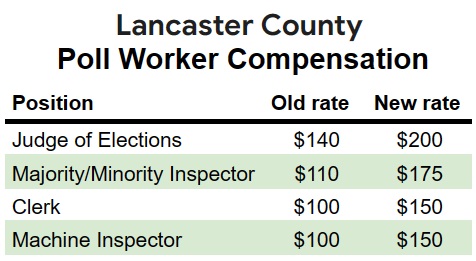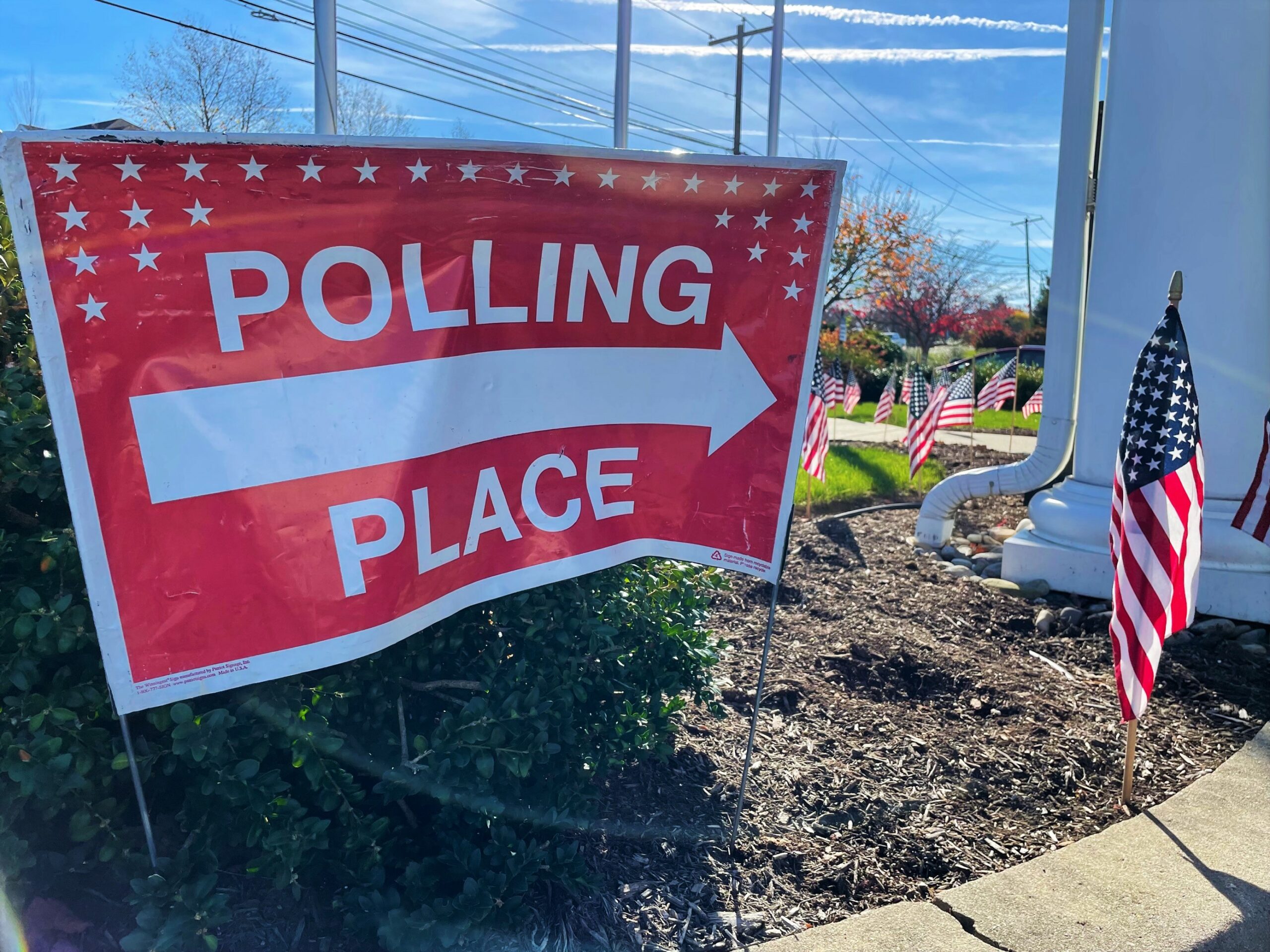Acting in their capacity as the Lancaster County Board of Elections, the county commissioners on Wednesday approved across-the-board raises in the Election Day compensation paid to poll workers, the first increase since 2016.

The raises, all 50% or more, apply to judges of elections, majority and minority party inspectors, clerks and voting machine inspectors. Judges of elections’ compensation was raised to $200, the maximum allowable under state law.
Compensation for attending training sessions ahead of Election Day was raised from $10 to $20. At $10, it was hardly covering the fuel costs that some volunteers were incurring to attend, Elections Chief Clerk Christa Miller said.
The county’s Election Integrity Grant from the state covers poll workers’ compensation, including the increases, Miller said.
More than 1,400 volunteers staff Lancaster County’s 240 precincts on Election Day. Additional staff work throughout the day at the County Government Center to canvass mail-in ballots.
“We appreciate the work of those who serve on Election Day in Lancaster County,” Commissioner Ray D’Agostino said, “and this increase in compensation says, ‘thank you’ and will help to maintain our poll workers for future elections.”
Ballot curing
Besides taking action on pay and hearing an update on preparations for the May primary, the board heard from county residents concerned about election integrity and transparency and briefly discussed ballot curing.
Ballot curing is the practice of allowing voters who cast mail-in ballots to correct clerical mistakes, such as forgetting to sign and date ballots. State election law is silent on the issue: Some counties allow it, others don’t.
The lack of uniformity has led to numerous court cases: Last November, Lancaster County held off on certifying its election results until a federal judge ruled that undated or misdated ballots that are otherwise valid should be counted.
Pennsylvania’s Act 77 explicitly requires mail-in ballot envelopes to be signed and dated. Voting rights advocates say the requirement is immaterial to determining voter eligibility and ballot security, and that not counting ballots due to mistakes, and not allowing fixes, disproportionately disenfranchises poor and minority voters. Their opponents say the law’s plain reading can’t simply be ignored.
On Wednesday, newly elected Commissioner Alice Yoder told her two colleagues she supports allowing ballot curing and asked if there was enough consensus to act on the issue at a future meeting.
Because the issue was not on Wednesday’s agenda, Commissioners Ray D’Agostino and Josh Parsons first confirmed with Solicitor Jackie Pfursich that merely disclosing an opinion would not violate Pennsylvania’s Sunshine Law. Having received her assurance, both reiterated the strong disapproval of ballot curing that they have expressed previously.
In light of their joint opposition, moving forward with a resolution that would be defeated wouldn’t make sense, Parsons told Yoder.
The Election Code’s silence on certain policies or procedures shouldn’t be construed as authorizing them, he said. He noted that mail-in voters are making fewer mistakes, and work is being done to reduce errors further, such as redesigned envelopes and reworded instructions and new instructional videos that the county is preparing to film and post on its website.
Given the totality of the Election Code’s provisions on ballot secrecy and security, it’s hard to believe ballot curing was intended to be permitted, D’Agostino said. As things stand, the issue remains up in the air statewide, he said: Since that’s the case, the worst thing the county could do would be to change its policy amid an election season.
“Hopefully this will get resolved,” he said, along with other policy concerns that counties have around election administration, but “it’s the legislature’s job, not ours.”
Verification and transparency
Melissa Ellis, an Ephrata resident, asked the board about the ballot reconciliation process and whether the results could be posted online.
She asked as well about the county’s testing of voting machines’ logic and accuracy, and whether the latter procedure is open to the public. Parties and candidates are invited, but historically the general public hasn’t been, Miller said.
The Pennsylvania Department of State’s directive on logic and accuracy testing stipulates that the process should be open to the public, Miller said, though the county may impose reasonable rules to ensure things are kept safe and orderly.
At present, logic and accuracy testing is done in the county Elections Office, Miller said, but there’s not a lot of space, so if outside observers are going to be accommodated, she would need a different location.
All three board members endorsed the idea of providing more transparency and access for the general public, but said they need first to decide how that would be managed.
“There has to be a procedure,” Parsons said.






